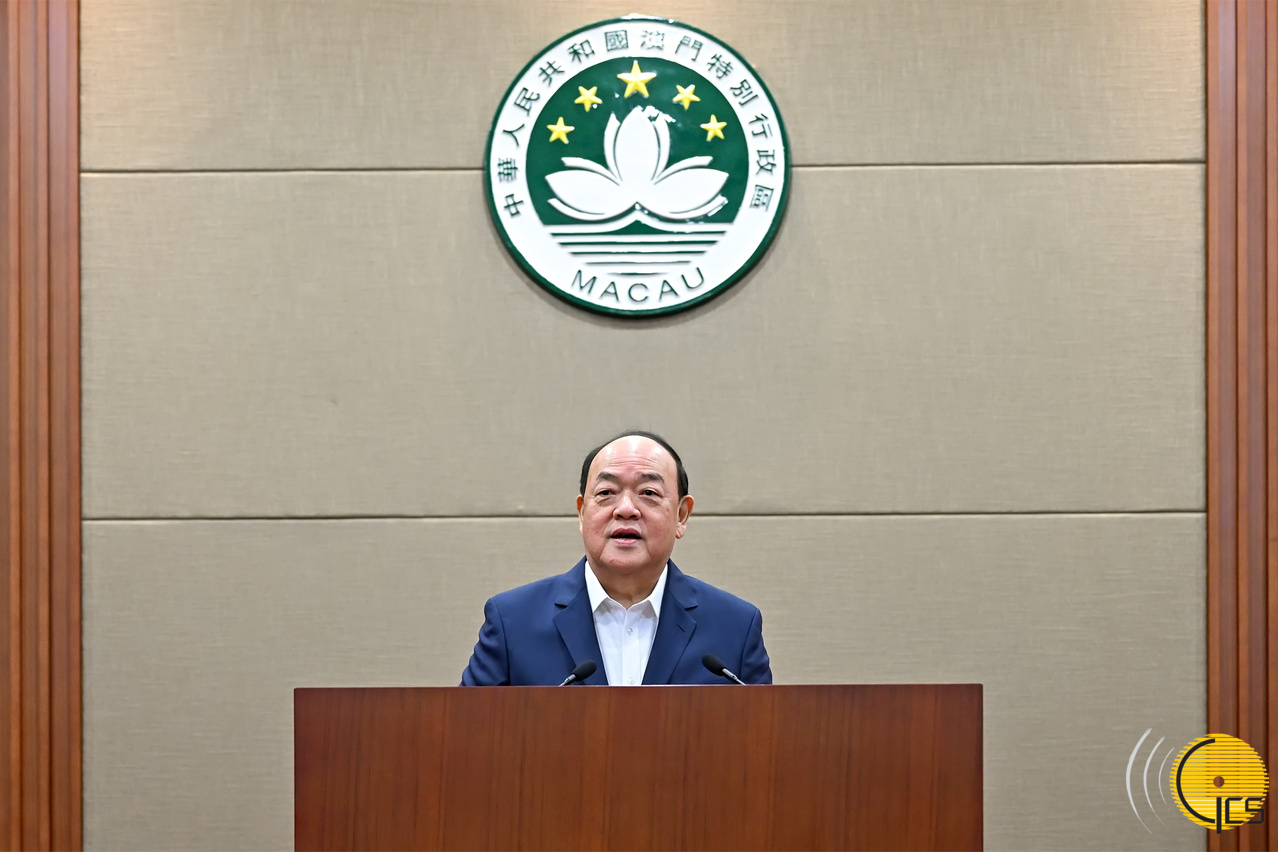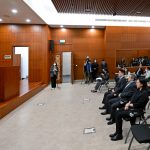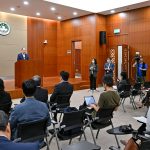 The Chief Executive, Mr Ho Iat Seng, holds a press briefing at the Macao checkpoint of the Hong Kong-Zhuhai-Macao Bridge, prior to his departure from Macao for a visit to Portugal, Luxembourg, and Belgium.
The Chief Executive, Mr Ho Iat Seng, holds a press briefing at the Macao checkpoint of the Hong Kong-Zhuhai-Macao Bridge, prior to his departure from Macao for a visit to Portugal, Luxembourg, and Belgium.
The Chief Executive, Mr Ho Iat Seng, said that a trip running from 18 to 27 April, taking in visits to Portugal, Luxembourg, and Belgium, aimed to strengthen friendly ties with those countries, as well as to deepen fields for collaboration, and to explore new opportunities for cooperation.
Mr Ho was speaking on Tuesday (18 April) evening to members of the press at the Macao checkpoint of the Hong Kong-Zhuhai-Macao Bridge, before leaving Macao on his journey to Europe.
Mr Ho is leading a Macao Special Administrative Region (MSAR) Government delegation and a Macao entrepreneur delegation to Portugal from 18 to 22 April. The MSAR Government delegation will then go on to visit Luxembourg and Brussels in Belgium, before returning to Macao on 27 April.
Portugal is the first overseas country to be visited by members of the current-term MSAR Government. The trip fully illustrated that the MSAR Government attached great importance to friendly relations between Macao and Portugal, as well as to Macao’s undertaking to enable exchange and cooperation between China and Portugal, said Mr Ho.
During the meeting with the press, Mr Ho said his visit to Portugal was about grasping fresh opportunities, with an aim to advance Macao’s role in serving as a commercial and trade cooperation service platform between China and Portuguese-speaking countries, and to further Macao’s appropriate economic diversification.
While in Lisbon, the Portuguese capital, he will meet with the President of the Portuguese Republic, Mr Marcelo Rebelo de Sousa; the Prime Minister, Mr António Luís Santos da Costa; and the Minister of Foreign Affairs, Mr João Gomes Cravinho. He will also meet officials from the Chinese Embassy in Portugal. These meetings will include discussions on how to bolster friendly ties between Macao and Portugal, and further cooperation in various fields.
In addition, the MSAR Government is to hold in Lisbon an economic, trade, and tourism promotion session. This is in order to provide fresh insights on the latest developments in Macao, and the new opportunities available in the MSAR and in the Guangdong-Macao Intensive Cooperation Zone in Hengqin, while also facilitating Macao-Portugal cooperation in the economic, trade, and tourism fields. While in Lisbon, Mr Ho will also meet with Macao students studying in Portugal.
Macao was concentrating its effort on promoting post-COVID-19 recovery, striving for economic development, and seeking overall social development, said Mr Ho. To this end, the MSAR Government had specially arranged for a delegation of Macao entrepreneurs to visit Portugal, for business-matching purposes; to hold a Macao-Portugal investment and tourism presentation at a seminar; and to take part in other activities. This was all in order to promote new developments in terms of economic, trade, and tourism cooperation, and provide more opportunities for Macao businesses, he added.
Macao was pressing ahead with its strategic positioning as “One centre, one platform, one base”, while pragmatically engaging with the “Belt and Road” initiative, and the Guangdong-Hong Kong-Macao Greater Bay Area, said Mr Ho. Portugal was a crucial part of the “Belt and Road” initiative. This year marked the 10th anniversary of the initiative’s promulgation, and the 20th anniversary of the establishment of the Forum for Economic and Trade Cooperation between China and Portuguese-speaking Countries (Macao).
The MSAR Government would make full use of the opportunities presented by the visit to Europe, to promote Macao’s role in supporting development of the “Belt and Road” initiative, and to explain Macao’s bridging functions for business and trade cooperation serving China and the Portuguese-speaking countries, said Mr Ho.
The Chief Executive additionally said that the visit to Portugal sought to consolidate the friendly relations between Macao and Portugal, and promote people-to-people exchanges. Taking into account Portugal's advantages in medicine, high and new technologies, and the maritime economy, it was hoped there would be further strengthening of the two sides’ ties in economic, trade, and scientific innovation matters, as well as in healthcare, and in cultural affairs. There was hope that additional enterprises from Portuguese-speaking countries would be attracted to set up base in the Greater Bay Area and the Cooperation Zone in Hengqin, in order to explore opportunities in the Chinese mainland market.
It was hoped that the visit to Portugal would also advance cooperation beneficial to Macao’s “1+4” approach for appropriate economic diversification, namely to enrich Macao’s role as “One Centre” for integrated tourism and leisure, while promoting development of four nascent industries, i.e., “Big Health”; modern financial services; high and new technology; and convention and exhibition, sports, and the commercial and trade sectors.
In Luxembourg, the MSAR Government delegation will meet with the Prime Minister. In Belgium, it will meet with the country’s Deputy Prime Minister and Minister of the Economy and Employment, and also with officials of the European Union (EU). In both countries, the Macao delegation will meet officials from the respective Chinese embassies. All the meetings will discuss how to facilitate exchange between Macao and EU member states in the areas of economic, trade, finance, technology, and tourism matters, and regarding easing of travel.
Mr Ho said Macao needed to draw on the successful experience of Luxembourg and Belgium in terms of their economic development, namely in the fields of finance, technological innovation, and infrastructure. These would help Macao to foster its effort for appropriate economic diversification, and strengthen the city’s exchanges with the two countries, creating new prospects in economic and trade matters, in finance, and in other fields.
Finally, the Chief Executive pointed out that the MSAR Government would act closely in line with the report of the 20th National Congress of the Communist Party of China, while making good use of the advantages arising from the “One country, two systems” principle, with a view to promoting more open cooperation and closer exchanges with other countries and regions. These would complement Macao’s effort in advancing the “One country, two systems” principle with Macao characteristics.
In response to reporters’ questions, the Chief Executive stressed that rule of law was a core value of Macao. The MSAR Government acted in accordance with the “One country, two systems” principle and the MSAR Basic Law in order to safeguard the rights of Macao residents and ensuring a solid protection for the implementation of the “One country, two systems” principle.
Since its return to the motherland, the MSAR had benefitted from substantial development. Macao had enhanced its governance system and capacity; the city had achieved leapfrog development in economic matters; the people’s livelihoods and well-being had been continuously improved, and social stability and harmony had been maintained, said Mr Ho. These achievements were a result – and a demonstration to the world – of the successful implementation of the “One country, two systems” with Macao characteristics.
Safeguarding the country’s sovereignty, security, and development interests was the highest priority of “One country, two systems” principle, stated Mr Ho. In light of the new situation and new needs, the MSAR Government needed to optimise its institutional framework and enforcement mechanism for safeguarding national security, advancing with the times: in order to achieve that, it needed to revise the Law for Safeguarding National Security, with a view to ensure the long-term stability of Macao.
Mr Ho added that Macao had in 2009 enacted its existing Law for Safeguarding National Security, in line with Article 23 of the MSAR Basic Law. Doing so was a constitutional responsibility and duty of the MSAR, he said. All Chinese citizens should respect the country’s Constitution, which took priority over the MSAR Basic Law.
Since the Law on Safeguarding National Security had been enacted in Macao, there had not been any issues related to limitations to human rights, said Mr Ho. A Government-proposed bill revising the Law on Safeguarding National Security, currently under review by the Legislative Assembly, consisted only of minor revisions, and had undergone sufficient consultation before being submitted to the legislature, he stated.
There had also been comparation with similar legislation in other jurisdictions, including EU member states. Macao’s legal system was inspired by the Portuguese legal system: the standards and related criminal penalties included in the Law on Safeguarding National Security should be similar to those in related jurisdictions. All countries had laws on safeguarding national security, including each of the 27 EU member states, and that had not led to limitation of human rights there. The Chief Executive added that he had recently met with consul generals of more than 40 countries stationed in Hong Kong and Macao, and they all had expressed positive comments after being briefed on the content of Macao’s Law on Safeguarding National Security.
Members of the MSAR Government delegation include: the Secretary for Economy and Finance, Mr Lei Wai Nong; the Secretary for Transport and Public Works, Mr Raimundo do Rosário; the Chief-of-Office of the Chief Executive’s Office, Ms Hoi Lai Fong; the Chief of Office of the Secretary for Economy and Finance, Ms Ku Mei Leng; and other director-level officials.
During Mr Ho’s absence, the Secretary for Administration and Justice, Mr Cheong Weng Chon, will be Acting Chief Executive.




